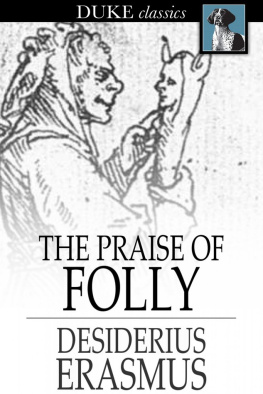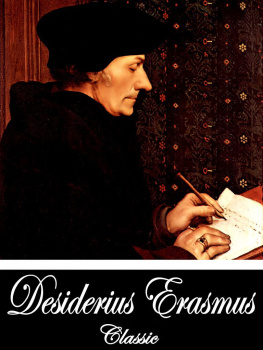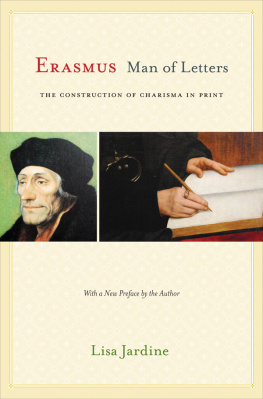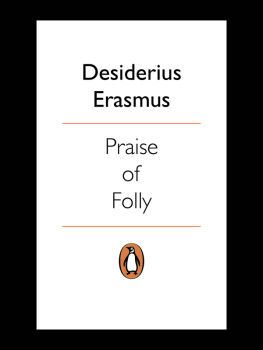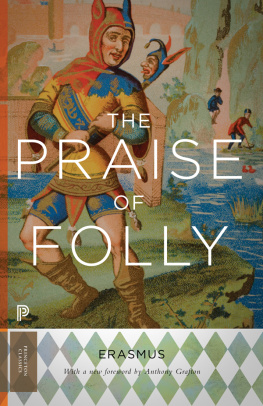Erasmus Desiderius - The Praise of Folly
Here you can read online Erasmus Desiderius - The Praise of Folly full text of the book (entire story) in english for free. Download pdf and epub, get meaning, cover and reviews about this ebook. City: Garfield Heights;Ohio, year: 2012, publisher: Duke Classics, genre: Science. Description of the work, (preface) as well as reviews are available. Best literature library LitArk.com created for fans of good reading and offers a wide selection of genres:
Romance novel
Science fiction
Adventure
Detective
Science
History
Home and family
Prose
Art
Politics
Computer
Non-fiction
Religion
Business
Children
Humor
Choose a favorite category and find really read worthwhile books. Enjoy immersion in the world of imagination, feel the emotions of the characters or learn something new for yourself, make an fascinating discovery.
- Book:The Praise of Folly
- Author:
- Publisher:Duke Classics
- Genre:
- Year:2012
- City:Garfield Heights;Ohio
- Rating:3 / 5
- Favourites:Add to favourites
- Your mark:
- 60
- 1
- 2
- 3
- 4
- 5
The Praise of Folly: summary, description and annotation
We offer to read an annotation, description, summary or preface (depends on what the author of the book "The Praise of Folly" wrote himself). If you haven't found the necessary information about the book — write in the comments, we will try to find it.
The Praise of Folly — read online for free the complete book (whole text) full work
Below is the text of the book, divided by pages. System saving the place of the last page read, allows you to conveniently read the book "The Praise of Folly" online for free, without having to search again every time where you left off. Put a bookmark, and you can go to the page where you finished reading at any time.
Font size:
Interval:
Bookmark:

From a 1668 edition
ISBN 978-1-62011-053-9
Duke Classics
2012 Duke Classics and its licensors. All rights reserved.
While every effort has been used to ensure the accuracy and reliability of the information contained in this edition, Duke Classics does not assume liability or responsibility for any errors or omissions in this book. Duke Classics does not accept responsibility for loss suffered as a result of reliance upon the accuracy or currency of information contained in this book.
As I was coming awhile since out of Italy for England, that I might notwaste all that time I was to sit on horseback in foolish and illiteratefables, I chose rather one while to revolve with myself something of ourcommon studies, and other while to enjoy the remembrance of my friends,of whom I left here some no less learned than pleasant. Among these you,my More, came first in my mind, whose memory, though absent yourself,gives me such delight in my absence, as when present with you I everfound in your company; than which, let me perish if in all my life I evermet with anything more delectable. And therefore, being satisfied thatsomething was to be done, and that that time was no wise proper for anyserious matter, I resolved to make some sport with the praise of folly.But who the devil put that in your head? you'll say. The first thing wasyour surname of More, which comes so near the word Moriae (folly) asyou are far from the thing. And that you are so, all the world will clearyou. In the next place, I conceived this exercise of wit would not beleast approved by you; inasmuch as you are wont to be delighted with suchkind of mirth, that is to say, neither unlearned, if I am not mistaken,nor altogether insipid, and in the whole course of your life have playedthe part of a Democritus. And though such is the excellence of yourjudgment that it was ever contrary to that of the people's, yet such isyour incredible affability and sweetness of temper that you both can anddelight to carry yourself to all men a man of all hours. Wherefore youwill not only with good will accept this small declamation, but take uponyou the defense of it, for as much as being dedicated to you, it is nowno longer mine but yours. But perhaps there will not be wanting somewranglers that may cavil and charge me, partly that these toys arelighter than may become a divine, and partly more biting than may beseemthe modesty of a Christian, and consequently exclaim that I resemble theancient comedy, or another Lucian, and snarl at everything. But I wouldhave them whom the lightness or foolery of the argument may offend toconsider that mine is not the first of this kind, but the same thing thathas been often practiced even by great authors: when Homer, so many agessince, did the like with the battle of frogs and mice; Virgil, with thegnat and puddings; Ovid, with the nut; when Polycrates and his correctorIsocrates extolled tyranny; Glauco, injustice; Favorinus, deformity andthe quartan ague; Synescius, baldness; Lucian, the fly and flattery; whenSeneca made such sport with Claudius' canonizations; Plutarch, with hisdialogue between Ulysses and Gryllus; Lucian and Apuleius, with the ass;and some other, I know not who, with the hog that made his last will andtestament, of which also even St. Jerome makes mention. And therefore ifthey please, let them suppose I played at tables for my diversion, or ifthey had rather have it so, that I rode on a hobbyhorse. For whatinjustice is it that when we allow every course of life its recreation,that study only should have none? Especially when such toys are notwithout their serious matter, and foolery is so handled that the readerthat is not altogether thick-skulled may reap more benefit from it thanfrom some men's crabbish and specious arguments. As when one, with longstudy and great pains, patches many pieces together on the praise ofrhetoric or philosophy; another makes a panegyric to a prince; anotherencourages him to a war against the Turks; another tells you what willbecome of the world after himself is dead; and another finds out some newdevice for the better ordering of goat's wool: for as nothing is moretrifling than to treat of serious matters triflingly, so nothing carriesa better grace than so to discourse of trifles as a man may seem to haveintended them least. For my own part, let other men judge of what I havewritten; though yet, unless an overweening opinion of myself may havemade me blind in my own cause, I have praised folly, but not altogetherfoolishly. And now to say somewhat to that other cavil, of biting. Thisliberty was ever permitted to all men's wits, to make their smart, wittyreflections on the common errors of mankind, and that too withoutoffense, as long as this liberty does not run into licentiousness; whichmakes me the more admire the tender ears of the men of this age, that canaway with solemn titles. No, you'll meet with some so preposterouslyreligious that they will sooner endure the broadest scoffs even againstChrist himself than hear the Pope or a prince be touched in the least,especially if it be anything that concerns their profit; whereas he thatso taxes the lives of men, without naming anyone in particular, whither,I pray, may he be said to bite, or rather to teach and admonish? Orotherwise, I beseech you, under how many notions do I tax myself?Besides, he that spares no sort of men cannot be said to be angry withanyone in particular, but the vices of all. And therefore, if there shallhappen to be anyone that shall say he is hit, he will but discover eitherhis guilt or fear. Saint Jerome sported in this kind with more freedomand greater sharpness, not sparing sometimes men's very name. But I,besides that I have wholly avoided it, I have so moderated my style thatthe understanding reader will easily perceive my endeavors herein wererather to make mirth than bite. Nor have I, after the example of Juvenal,raked up that forgotten sink of filth and ribaldry, but laid before youthings rather ridiculous than dishonest. And now, if there be anyone thatis yet dissatisfied, let him at least remember that it is no dishonor tobe discommended by Folly; and having brought her in speaking, it was butfit that I kept up the character of the person. But why do I run overthese things to you, a person so excellent an advocate that no man betterdefends his client, though the cause many times be none of the best?Farewell, my best disputant More, and stoutly defend your Moriae.
From the country,the 5th of the Ides of June.
At what rate soever the world talks of me (for I am not ignorant what anill report Folly has got, even among the most foolish), yet that I amthat she, that only she, whose deity recreates both gods and men, eventhis is a sufficient argument, that I no sooner stepped up to speak tothis full assembly than all your faces put on a kind of new and unwontedpleasantness. So suddenly have you cleared your brows, and with so frolicand hearty a laughter given me your applause, that in truth as many ofyou as I behold on every side of me seem to me no less than Homer's godsdrunk with nectar and nepenthe; whereas before, you sat as lumpish andpensive as if you had come from consulting an oracle. And as it usuallyhappens when the sun begins to show his beams, or when after a sharpwinter the spring breathes afresh on the earth, all things immediatelyget a new face, new color, and recover as it were a certain kind of youthagain: in like manner, by but beholding me you have in an instant gottenanother kind of countenance; and so what the otherwise great rhetoricianswith their tedious and long-studied orations can hardly effect, to wit,to remove the trouble of the mind, I have done it at once with mysingle look.
Font size:
Interval:
Bookmark:
Similar books «The Praise of Folly»
Look at similar books to The Praise of Folly. We have selected literature similar in name and meaning in the hope of providing readers with more options to find new, interesting, not yet read works.
Discussion, reviews of the book The Praise of Folly and just readers' own opinions. Leave your comments, write what you think about the work, its meaning or the main characters. Specify what exactly you liked and what you didn't like, and why you think so.

